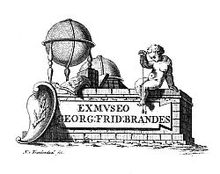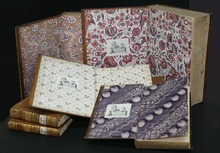Georg Friedrich Brandes
Georg Friedrich Brandes (baptized December 12, 1719 in Celle ; † September 6, 1791 in Hanover ) was a German lawyer, university advisor to the Hanover government, and a book and art collector.
Live and act
Brandes was the son of Georg Friedrich Brandes (1688–1778), royal and electoral councilor and court court secretary in Celle. He studied law at the Universities of Göttingen and Leiden . From 1740 he was court master of the von Steinberg family and traveled through Holland, England and Germany with Georg Friedrich von Steinberg on a grand tour . After his return in 1746 he was employed as a secretary at the electoral secret chancellery in Hanover, where he was responsible for overseeing the so-called monastery and Lüneburg saltworks expedition . After several diplomatic missions to various German courts, in 1770, at the suggestion of the curator of the University of Göttingen, Gerlach Adolph von Münchhausen, shortly before his death, he was given responsibility for government affairs at the University of Göttingen. Through insightful advice , Brandes had a share in the growth of the university under six successive curators until his death. His long-time friend and son-in-law (since 1777) Christian Gottlob Heyne was his closest confidante on the part of the professors.
Brandes' effectiveness for art and science extended far beyond his official work. In 1770 he received the character (honorary rank) as a councilor and was appointed dean of the Bonifatius-Stift in Hameln . He drafted the plan for a servant (civil servant) widow's casse and thus gave the impetus for the establishment of the Calenberg general widow's casse .
As an opponent of the literary societies , Brandes was the main one of 6 initiators of the Great Reading Society founded on October 20, 1799 in Hanover.
For many years he was a contributor to the journal Library of Fine Sciences and a reviewer of English and Italian works on art. He wrote extensive advertisements on English copperplate engravings as well as contributions to Carl Heinrich von Heineken's Dictionnaire des artistes and the Göttingen scholars advertisements .
family
Brandes was married to his stepsister Marie Friederike (1730-1807), daughter of Conrad Wilhelm Werckmeister, Braunschweig-Lüneburg Council, and Dorothea Schultze, who had married his father Georg Friedrich Brandes for the second time. The couple had a son, the later lawyer Ernst Brandes (1758-1810), and three daughters, including Louise Amalie, who married the Göttingen physician and zoologist Johann Friedrich Blumenbach († 1840), and Georgine Christine Dorothea, the future wife of the Göttinger Philologist Christian Gottlob Heyne († 1812).
Collections
Library

Brandes library is one of the most important German private libraries of the Enlightenment . Brandes had put this library together in the course of his life and had consulted with Göttingen university librarians, especially Christian Gottlob Heyne . Combining the elements of a learned and bibliophile library encompasses all scientific subjects. However, the 22,000 volumes have a clear focus on the history of science and the humanities, especially in the area of antiquity and linguistics and literature. It also contains manuscripts such as the postscript of a lecture on algebra by Abraham de Moivre that Brandes heard in London in 1742 . With its richly decorated leather bindings and bookcuts, the library is clearly bibliophile .
In 1790, Duke Peter Friedrich Ludwig von Oldenburg bought the encyclopedic library, comprising around 22,000 volumes, for 24,000 thalers. In 1792 it formed the basis of today's Oldenburg State Library . Today, however, it is no longer kept as a closed collection, but is integrated into the old system of the inventory. However, it can still be clearly identified through the typical bindings as well as the numerous bookplates and handwritten name notes. Since the end of 2010, a selection of around 200 volumes has been presented in the so-called Brandes Digital Collection of the State Library. The digitization took place as part of a project on site and was related to a large exhibition about Brandes, which was shown from November 2010 to February 2011 in the State Library.
Engraving collection
Brandes also owned one of the most important collections of copper engravings of his time, comprising over 42,000 sheets, including 15,000 portraits of scholars and over 550 sheets by Albrecht Dürer . He himself had designed a catalog in four folio volumes according to the five schools (Italian, Dutch, French, German and English painting school), which after his death Professor Michael Hubert (1727–1804) in 1793 as the Catalog raisonné du Cabinet d'Estampes de feu Mr. Brandes edited in two volumes. The copper engraving collection was sold in two parts on April 18 and October 3, 1796 in Leipzig and is now considered lost. The portrait collection was auctioned for Emperor Franz I of Austria (1768–1835) by the Viennese commission agent Franz Xaver Stöckl and incorporated into the emperor's portrait collection.
Works
- Remarks on the London, Paris and Vienna theaters. Göttingen: by Johann Christian Dieterich 1786
literature
- News from the copper collection of Mr. Hofrath Brandes in Hanover. in: Annals of the Braunschweig-Lüneburgischen Churlande , Volume 1, Hanover: Pockwitz 1787, pp. 101-105 ( digitized version )
- Ferdinand Spehr : Brandes, Georg Friedrich . In: Allgemeine Deutsche Biographie (ADB). Volume 3, Duncker & Humblot, Leipzig 1876, p. 242.
- Goetz von Selle: Brandes, Georg Friedrich. In: New German Biography (NDB). Volume 2, Duncker & Humblot, Berlin 1955, ISBN 3-428-00183-4 , p. 519 f. ( Digitized version ).
- Gabriele Crusius:
- Collecting culture in the spirit of the Enlightenment: the library of the Hanoverian civil servant Georg Friedrich Brandes in the Oldenburg State Library [book accompanying the exhibition from November 25, 2010 to February 26, 2011 in the Oldenburg State Library]. Heidelberg: Universitätsverlag Winter, 2010, ISBN 978-3-8253-5762-7 .
- Enlightenment and bibliophilia: the Hanoverian collector Georg Friedrich Brandes and his library. Heidelberg: Winter, 2008 ( Euphorion , Supplements to the Euphorion; H. 54) Zugl .: Oldenburg, Univ., Diss., 2007 ISBN 978-3-8253-5422-0
- Georg Friedrich Brandes and his library. A contribution to the cultural and educational history of the Hanoverian city patriciate in the 18th century , in: Euphorion , Volume 80 (1986), pp. 83-103
- Patrick Poch: Portrait galleries on paper. Collecting and arranging print portraits using the example of Emperor Franz I of Austria and other princely collectors. Böhlau Verlag, 2018, ISBN 978-3-205-20529-6
- Heinrich Wilhelm Rotermund : The learned Hanover or lexicon of writers, learned businessmen and artists who have lived and are still alive since the Reformation in and outside of all the provinces belonging to the Kingdom of Hanover, compiled from the most credible writers , Schünemann, Bremen 1823, Pp. 246-247
- RWLE Möller : Celle Lexicon. From Abbensen to between . Hildesheim: Lax, 1987, p. 26
- Klaus Mlynek : Brandes, (2) Georg Friedrich , in: Hannoversches Biographisches Lexikon , p. 68
- German Biographical Encyclopedia , Volume 2, p. 63
Web links
- Literature by and about Georg Friedrich Brandes in the catalog of the German National Library
Individual evidence
- ↑ The reference in ADB that he traveled with the later General Johann Ludwig von Wallmoden-Gimborn as the leader of the latter does not appear credible, since he was born in 1736
- ↑ ADB (lit.)
- ^ Ludwig Hoerner : Reading Society, Große L. , in: Stadtlexikon Hannover , p. 401; Preview over google books
- ↑ Menso Folkerts: An algebra lecture by Abraham de Moivre , in: Form, number, order: Studies on the history of science and technology: Ivo Schneider on the 65th birthday. (Boethius. Texts and treatises on the history of mathematics and natural sciences 48). Franz Steiner Verlag, 2004, ISBN 3-515-08525-4 , pp. 269-277
- ^ Digital collections of the Oldenburg State Library
- ↑ Notes ( Memento of December 4, 2010 in the Internet Archive ) on the exhibition
- ^ Patrick Poch: Portrait galleries on paper. Collecting and arranging print portraits using the example of Emperor Franz I of Austria and other princely collectors. Böhlau Verlag, 2018, ISBN 978-3-205-20529-6
| personal data | |
|---|---|
| SURNAME | Brandes, Georg Friedrich |
| BRIEF DESCRIPTION | Hanoverian lawyer, art and book collector |
| DATE OF BIRTH | baptized December 12, 1719 |
| PLACE OF BIRTH | Celle |
| DATE OF DEATH | September 6, 1791 |
| Place of death | Hanover |


